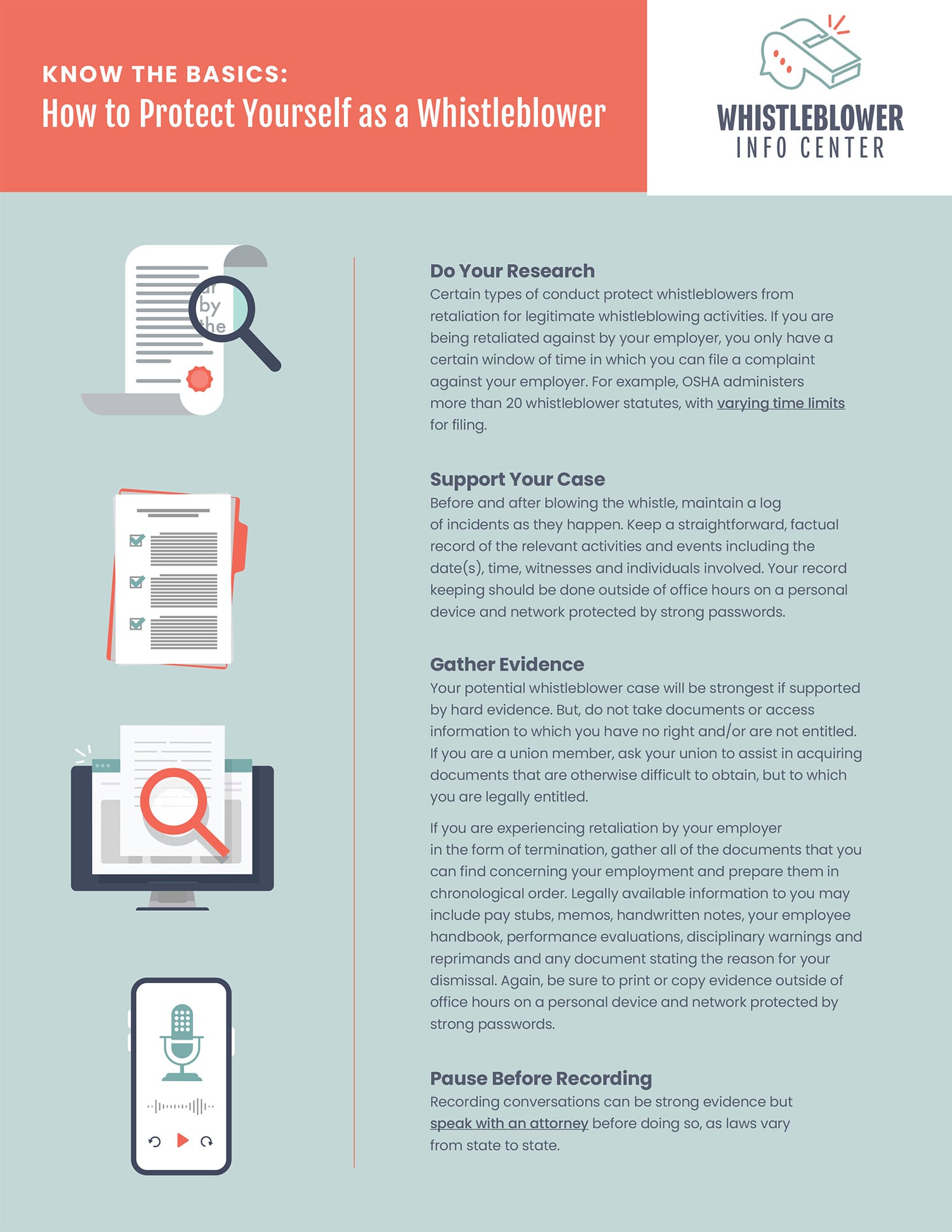Are Whistleblowers Protected by Law?
Whistleblowers are courageous individuals who expose someone else’s unlawful practices. Since most whistleblower cases are employee vs. employer, with the employee blowing the whistle on the employer’s lawbreaking, whistleblowers are often the target of retaliation.
Fortunately, there are various laws that uphold a whistleblower’s rights and help protect them from retaliation. These laws vary depending on the type of unlawful activity you’re reporting.
Get Our Guide to Protecting Yourself as a Whistleblower
Request our FREE Whistleblower Protection Guide so you’re knowledgeable on the basics of protecting yourself before you come forward with a potential case.
1. Protected disclosure
A protected disclosure is an act of blowing the whistle on specific unlawful activities, depending on the agency involved, and not suffering consequences for it.
For example, exposing a company’s practices that result in damaging the environment is considered protected disclosure under the Environmental Protection Agency. Environmental statutes like the Clean Water Act, Safe Drinking Water Act, and the Clean Air Act all have whistleblower protection provisions in them.
Similarly, the IRS, through their whistleblower program, the Dodd-Frank Act for the SEC, and the False Claims Act protect whistleblowers from retaliation with anti-retaliation provisions. Keep in mind, though, that not all whistleblower claims may be covered. Consult with your attorney.
2. Maintaining your anonymity
The fear of retaliation can make a whistleblower reluctant to reveal their identity. Fortunately, you can remain an anonymous whistleblower in certain whistleblower cases.
However, while certain government organizations like the abovementioned EPA and SEC allow whistleblower anonymity, you must keep in mind that not disclosing your identity can impede the speed and accuracy of the resulting investigation.
Other whistleblower programs, like the IRS, don’t allow you to file anonymously. In any type of whistleblower case, you may need to testify in court, so your identity cannot remain anonymous. In other cases, the individuals or institutions you’re filing fraud against may already know who you are or be able to deduce your identity from the information provided.
An attorney can help you understand your options and risk.
3. Retaliation protection
Whistleblowers who bravely choose to testify against individuals or institutions and their unlawful practices without obscuring their identity risk retaliation. In the workplace, you may be fired, demoted, or suspended as an act of retaliation if you’re a whistleblower. It can also take the form of harassment and creating a hostile working environment.
Fortunately, whistleblowers are protected by various laws. The Whistleblower Protection Act of 1989 protects federal whistleblowers from adverse consequences related to their employment. This includes protection against unlawful termination, pay cuts, or demotion.
There is also the Notification and Federal Employee Antidiscrimination and Retaliation Act or No FEAR Act of 2002. This holds managers and supervisors accountable when they violate whistleblower protection laws by discriminating against employees who blow the whistle.
Whistleblowers who suffer retaliatory actions can be:
- Reinstated to their former job
- Reimbursed for the wages and benefits lost after an unlawful termination
- Paid damages for pain and suffering
- Reimbursed for attorney’s fees and other legal costs
Keep in mind that not every whistleblower claim may be completely protected from retaliation. Consult with your whistleblower attorney so you can figure out the best way to protect yourself.
4. Qui tam lawsuit
Whistleblowers against companies that defrauded the government can file a qui tam lawsuit. This enforces the False Claims Act and rewards whistleblowers for coming forward if the fraud is proven.
This type of lawsuit protects the whistleblower since the government can decide to intervene and take over the prosecution. Once this happens, the whistleblower may receive up to 25% of what the government recovers. If they don’t step in and the whistleblower pursues the lawsuit on their behalf, the whistleblower can get a reward of up to 30% of what the government receives.
Apart from all these, whistleblowers can rest assured that they are granted a fair trial with a neutral arbiter taking over. With legal procedures followed and sufficient evidence presented, the chances of winning are significant.
Learn More About Your Rights
For more information about whistleblower rights and protection, get in touch with Whistleblower Info Center. As a trusted online resource for whistleblowers, we can answer your questions about your rights. Schedule a free consultation for more information.
Whistleblower Protection Frequently Asked Questions
Can a whistleblower remain anonymous?
Yes, in most cases a whistleblower can remain anonymous. There are substantial benefits to stepping forward with a whistleblower claim, but anonymity can protect you from retaliation in many situations.
Why can whistleblowers remain anonymous?
One of the main reasons individuals do not report violations of the law is the fear of retaliation. By filing a whistleblower report anonymously, you can avoid many issues that can pop up as a result of becoming a whistleblower.

